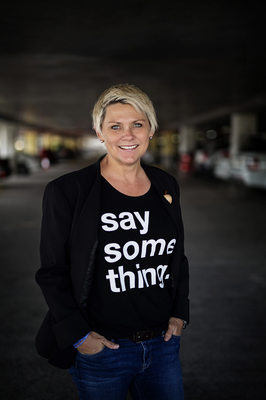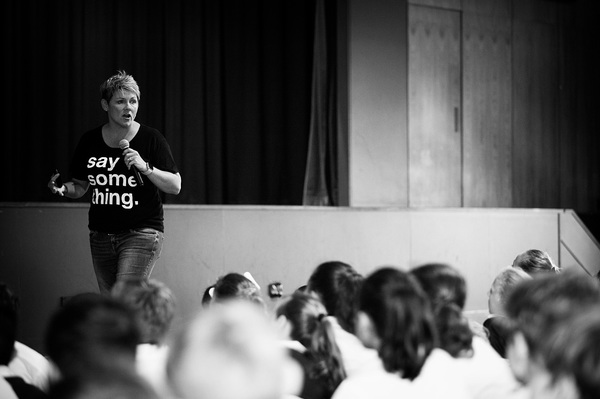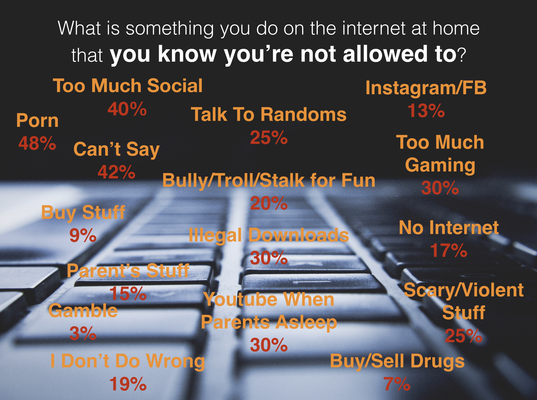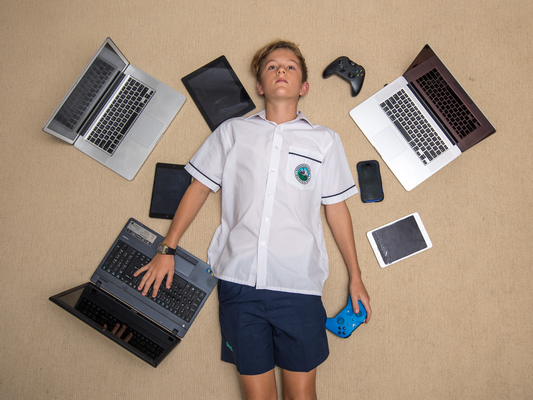By Hollie Harris
Co-founder of Apple, Steve Jobs never let his own children have an iPad and Microsoft co-founder Mr Bill Gates insisted on a limited amount technology use with his own children.
These experts recognised that the very technology they were selling to the world would affect our well-being so significantly and shielded their own children from it.
Screen addiction has reached epidemic proportions in Australia since the 2007 release of the first iPhone and although many parents were cautious in allowing their kids access to the new fad, most kids today own several devices with unlimited internet.
Psychologists are quickly learning how dangerous smartphones can be for teenage brains with research revealing that an eighth-grader’s risk for depression jumps 27 percent when he or she frequently uses social media. Google itself unveiled an initiative targeted at addressing tech addiction just last week.
Former Queensland teacher, Rachel Downie, who is now an online child safety and anti-bullying advocate says parents are unaware of about 80 per cent of what their teen engages in on the internet at home.
Rachel, the founder of anti-bullying website Stymie, issued a room full of concerned parents at Sunshine Beach State High School recently one big wake-up call. Technology is taking over our kids lives at vast rates and its time to take the power back.
Safety
Rachel revealed results to a survey of more than 20,000 students over the last five years, asking “what’s something you do on the internet at home that you know you’re not allowed to do?“ (See image for results)
Ms Downie said 51 per cent of children, mostly year 8 boys, had viewed pornography or other illicit material, while one-fifth of respondents admitted to bullying, trolling and stalking for fun.
“In schools I go into, kids in years four, five and six have their own devices, and I have to tell you the amount of harm that is being done to kids and to each other at that age in terms of the cyber bullying is out of control,” says Rachel.
This really has become an issue about your child’s future mental health and safety.
Our kids are growing up with a distorted understanding of sex. Sharing nude pictures online have now become common practice. Rachel says that 20 percent of the girls who took part in her study have been asked to share nude images and nearly 100 percent of these girls obliged.
There are now apps which hide forbidden apps to prying eyes – some look like calculators and Snapchat has a ‘My Eyes Only’ feature which can be activated to hide extra private content from others.
Even though a social media account is on private, the public can still see photos quite easily. Especially if you connect your Instagram to other social networks.
Instagram actually warns about this in their privacy settings:
“If someone with a private profile shares a photo or video to a social network (like Twitter, Facebook, Foursquare and so on) using Instagram, the image will be visible on that network and the permalink will be active. In other words, the photo will be publicly accessible by anyone who has access to its direct link/URL” – Instagram.
Online gaming is more concerning than you may think too – the game might be clean but the gamers might not be.
The National Crime Agency warns that the latest gaming craze Fortnight is open slather to paedophiles. One mother claimed her 12-year-old son was offered V-Bucks (online money) to perform a sex act during playing Fortnight. Not to mention that experts say Fortnight is touted as the most addictive game ever made.
Grand Theft Auto is well worth having a play of yourself to see the level of violence your kids are growing up with. The violence and sexual vilification of women in GTA can now be played out in first person.
In GTA, a gamer can purchase a woman to perform different sexual acts and after purchasing her, the gamer can choose to kill her — and actually is incentivised to kill her to get his money back. At present, GTA V is one of the most popular video games in the US where, one in four women will experience some form of sexual violence by the time she turns 18 and one in five young women on college campuses will experience sexual assault.
Addiction
Aussie kids are now spending an average of 33 hours a week online or gaming. That’s a full-time job!
A Qualtric and Accel survey revealed that some millennial social media users are checking their device up to 150 times each day.
Rachels study revealed that many kids are sneaking online after parents are asleep, some set alarms to wake during the night. Social media and games ping alerts on your kids’ devices all through the night and many are only surface sleeping.
Rachel says this is an unchartered time for parents and most are unaware of how far down the spiral their kids have gone.
“[They say] ’I’m embarrassed and don’t know what to do … my son is so addicted to gaming,” Rachel says.
“Lots of single mums say they’re frightened of their son due to physical threats if she doesn’t let him play,“ she says. Seek help if you are in this situation.
Signs of addiction
“If your child can’t walk away from your device when you ask them to, if they are stressed and don’t seem to be able to engage in anything else other than things on those devices, well then, they have an addiction problem,“ Ms Downie said.
The World Health Organisation this year recognised internet gaming disorder (IGD) as a mental health condition.
- Losing interest in real life activities.
- Sneaking online or begging/bargaining.
- Emotional outburst during usage or when time is up.
- Not engaging in activities or sports they used to do.
- When it causes conflict in the household.
Solutions
“It’s about being a grown-up and being the boss and getting your techno power back and saying, ’look we’re going to set some boundaries around this stuff at home,” Rachel says.
- Admit to your child you made a mistake letting things get this far. Tell them you love them enough to make some big changes and that you value family more than technology.
- Adequate parental supervision and keeping conversations open is key. Remember when we used to keep the family computer in the lounge? An open-door policy is a good one. If they need the door shut, we have to ask why?
- Talk about respecting their bodies and not being pressured to share intimate pictures. They may not understand what their images are ‘saying’ in reality or that people can screenshot them to keep.
- Make sure they know it is unacceptable to ask anyone to share an intimate picture
- Do not enter into the “trust” debate with your kids. “I can’t believe you don’t trust me!” This is not about whether or not you trust them, this is about mental health, safety and living in the real world.
- With all the notifications these days, keeping devices out of their rooms is vital for decent sleep.
- If your child spends hours a day on a device or a game, they will need your help to fill up this time. The creative pathways in their brains are fast asleep at this point, so expect they won’t be able to think of a single thing to do instead. This does improve over time. You may eventually find your kids playing out in the street again or climbing trees. Older kids might pick up a musical instrument or string up some slack lines in the backyard.
- Check their devices. This is your right. Even if they bought it, you still have a parental right to know what your child or teen is doing. Locking their phone and apps from you is unacceptable. Perhaps give them a 24-hour warning before you do this – plenty of time to ditch anything inappropriate and start a clean slate.
- Most importantly, we really need to teach our kids how to manage their usage themselves and why it’s so important so they can function as adults without us around to ‘police’ them.
- Consequences? Technology is a privilege, not a right. Set up some clear rules and consequences. Perhaps sneaking online gets a ’one week, zero tech’ consequence. Give them a clear day and time consequence ends and encourage them to make it.
- Drama? You can always extend it for another day if they make a fuss about it. If they break the rule again, give them a whole month. Don’t expect this to be easy!
- Spread the word. Tell other parents you are taking the power back and getting your kids back into real life. If your kids are having a sleepover, don’t be afraid to mention to the parents that you have a few tech rules. You may just inspire some change in their household too.
- Be a good example to your kids and detox yourself off the tech-juice too.
Bullying, sexual and explicit text and imagery, online stranger, normalisation of sex and rape, addiction, self-doubt and low self-esteem, depression, anxiety, exhaustion and a lack of reality are just a few of the realities our online kids are dealing with. Is it worth it?
Sadly, joy and satisfaction from everyday life is becoming harder for our young tech-heads to find outside a screen and childhood depression has risen to alarming rates. Youth suicide has now surpassed motor accidents as the number one cause of death.
Take an honest look at your child or teens relationship to technology. It is our moral responsibility as parents to give them a better future than this. There is big business in keeping us hooked and these incredibly wealthy companies prey on the addictive nature of their products to sell to your kids.
Remember, we all fell down the rabbit hole together and if we want our kids to be okay, we need to pull them out of it together.
If you or your family need further help:
Lifeline on 13 11 14
Kids Helpline on 1800 551 800







![[READER COMPETITION] – Win tickets to see Sharon and Slava Grigoryan present ‘OUR PLACE’](https://noosatoday.com.au/wp-content/uploads/2025/07/sharon-and-slavav-324x235.png)




